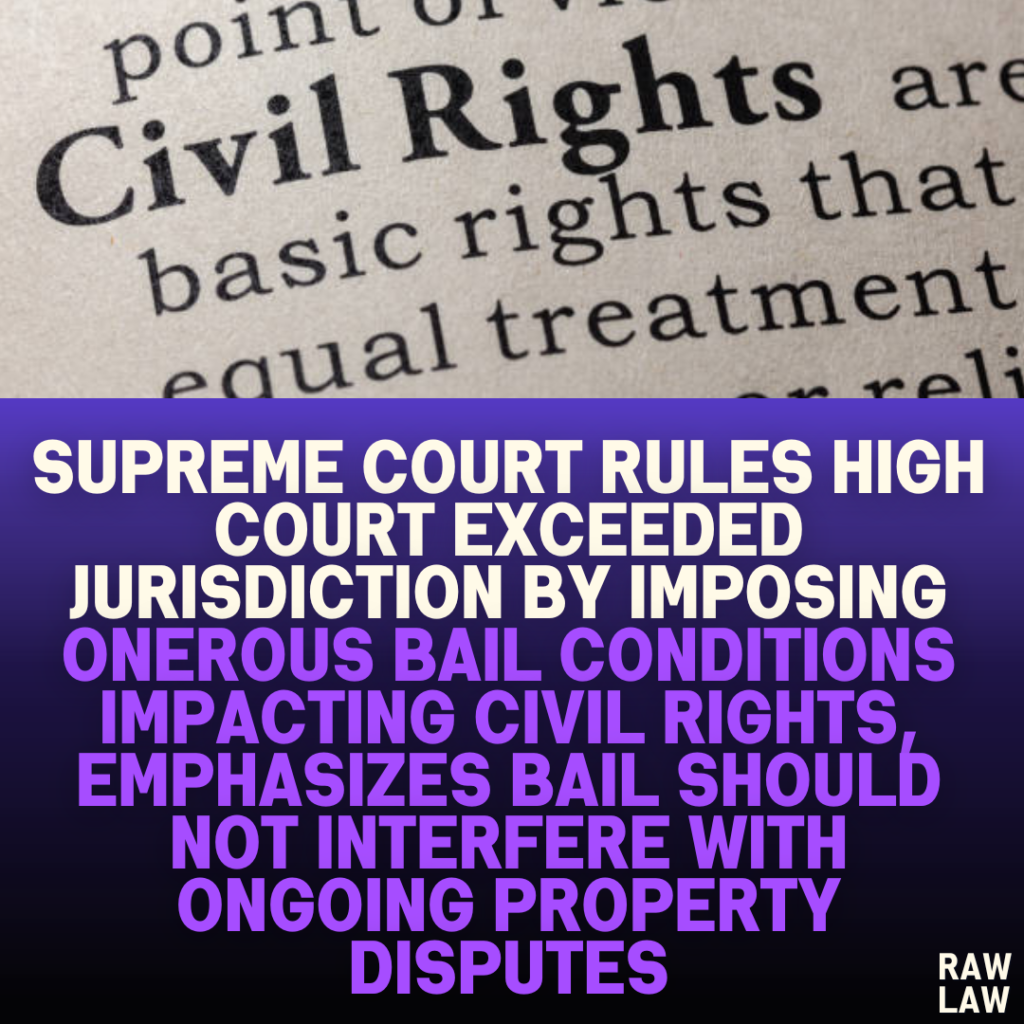Court’s Decision
The Supreme Court set aside the bail conditions imposed by the Madhya Pradesh High Court, which required the appellants to bear the expense of removing a wall and transfer possession of disputed property to the complainant. The Court held that these conditions exceeded the High Court’s jurisdiction under Section 439 of the Criminal Procedure Code (CrPC) as they went beyond ensuring the accused’s presence during trial.
Facts
An FIR was lodged on April 22, 2024, accusing the appellants of forcibly entering the complainant’s property, breaking a wall, and assaulting the complainant’s family. The appellants were subsequently arrested, and after an initial bail application was dismissed, a second bail application was allowed by the High Court with stringent conditions. The High Court ordered the appellants to finance the wall’s removal and transfer possession of the disputed property to the complainant, leading to the present appeal.
Issues
- Did the High Court exceed its authority under Section 439 CrPC by imposing conditions unrelated to bail?
- Were the High Court’s directives concerning property possession and wall removal valid within the bail proceedings?
Petitioner’s Arguments
The appellants contended that the High Court’s conditions were excessive and irrelevant to bail, thereby infringing upon their civil rights. They argued that the bail conditions should solely ensure their appearance during trial, not adjudicate property possession, especially with a pending civil suit on the matter.
Respondent’s Arguments
The respondent argued that the conditions were appropriate due to the appellants’ alleged forceful entry into the complainant’s property and the harm caused. The complainant’s counsel maintained that these conditions were necessary to prevent further disturbance and ensure the complainant’s right to property.
Analysis of the Law
The Supreme Court analyzed Section 439 CrPC and observed that bail conditions must directly relate to securing the accused’s presence during trial. The Court referenced Parvez Noordin Lokhandwalla v. State of Maharashtra, which limits bail conditions to preventing obstruction of justice and ensuring the accused does not misuse bail. Further, Sumit Mehta v. State (NCT of Delhi) emphasized that conditions should be reasonable, while Dilip Singh v. State of Madhya Pradesh underscored that bail conditions are not a means to settle civil disputes.
Precedent Analysis
In Mahesh Chandra v. State of U.P., the Court held that bail conditions should not decide civil disputes, reinforcing that the judiciary’s role in bail is limited to criminal matters.
Court’s Reasoning
The Supreme Court held that the High Court’s conditions amounted to civil rights deprivation rather than a bail-related measure. It emphasized that bail conditions should not interfere with civil property rights, especially with ongoing civil litigation between the parties. The Court stressed that bail conditions should focus on the accused’s presence and compliance without affecting civil claims.
Conclusion
The Supreme Court concluded that the High Court had overreached by imposing conditions concerning property possession, thus setting aside those parts of the High Court’s order. The appellants remain on bail but without the requirement to finance wall removal or transfer property possession.
Implications
This ruling clarifies that while courts may impose conditions on bail, they should refrain from intervening in civil property disputes, underscoring the separation between criminal and civil jurisdiction within bail jurisprudence.
